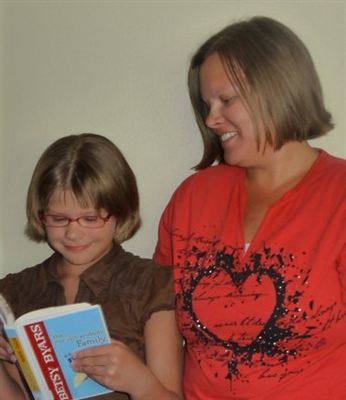Mom of Struggling Reader Finds Help and Speaks Out for College of Optometrists in Vision Development’s National Children’s Vision and Learning Month

Aurora, OH, July 10, 2012 – Despite being told by five different eye doctors that her 8-year-old daughter Shelby’s vision was fine, Lynn DeVore of Yakima, Washington continued to search for reasons why her daughter continued to struggle with reading. The pediatrician said that since the eye doctors said Shelby’s vision was fine that Lynn “was just being paranoid and that maybe Shelby was simply not very smart.” She continued to search until she found the answer and now DeVore is stepping forward to help other parents by sharing their story for National Children’s Vision and Learning Month.
“We knew there was a problem early on, but we were told she would read soon. We struggled and struggled and still reading was a fight. Shelby was very frustrated with reading and had very little confidence in all areas of her life,” shares DeVore. Fortunately she saw an ad in a local magazine that listed all the things Shelby struggled with. The ad was for a developmental optometrist who provides an in-office program of optometric vision therapy.
The evaluation confirmed that Shelby did in fact have a vision problem. It was convergence insufficiency, an eye coordination problem that can make reading very difficult. After completing the prescribed program of vision therapy, Shelby went from reading at 1st grade level to reading on grade level.
How could so many eye doctors have missed this? A very good question! When parents suspect their children have a vision problem that is contributing to their learning difficulties they often go to the pediatrician or the pediatric ophthalmologist only to be told their child’s vision is fine and they can see 20/20. States Dr. David Damari, President of the College of Optometrists in Vision Development, “It is important for parents to know that when it comes to the diagnosis and treatment of vision problems which interfere with reading and learning, a comprehensive vision exam is needed. These children need to see an optometrist who provides an in-office program of vision therapy and performsthe in-depth testing required to determine if the child has all the visual skills required for academic success,”.
Despite volumes of evidence-based optometric research, many pediatricians and ophthalmologists continue to state that vision has nothing to do with learning, referring parents to psychologists, learning specialists, etc. However, the limitations caused by convergence insufficiency and similar visual disorders can be disabling during reading and computer use according to the definitions of disability in the Americans with Disability Act, but these disorders are all easily treatable with optometric vision therapy.
The five most common signs that a vision problem may be interfering with your student's ability to read and learn are:
1. Skips lines, rereads lines
2. Poor reading comprehension
3. Takes much longer doing homework than it should take
4. Reverses letters like “b” into “d” when reading
5. Has a short attention span with reading and schoolwork
Any one of these symptoms is a sign of a possible vision problem. A more in-depth symptoms checklist is available on COVD's website.
It is vital that parents take the time to learn all of the signs that a vision problem may be interfering with academic performance. When a child has a vision problem, they do not outgrow it, and despite extensive tutoring or special services at school, very little improvement occurs.
Shelby was lucky that her mother didn’t take no for an answer. Take 5 minutes in honor of August being National Children’s Vision and Learning Month and visit the website for the College of Optometrists in Vision Development; then spread the word and share the information: www.covd.org.
NOTE: Mrs. DeVore is available for interviews. In addition, other parents from across the U.S. are available to be interviewed.
About COVD
The College of Optometrists in Vision Development (COVD) is an international, non-profit optometric membership organization that provides education, evaluation and board certification programs in behavioral and developmental vision care, vision therapy and visual rehabilitation. The organization is comprised of doctors of optometry, vision therapists and other vision specialists. For more information on learning-related vision problems, vision therapy and COVD, please visit www.covd.org or call 888.268.3770.
CONTACT: Pamela R. Happ, CAE
COVD Executive Director
888.268.3770 tel
Email: phapp@covd.org
Website: www.covd.org
Tags:

